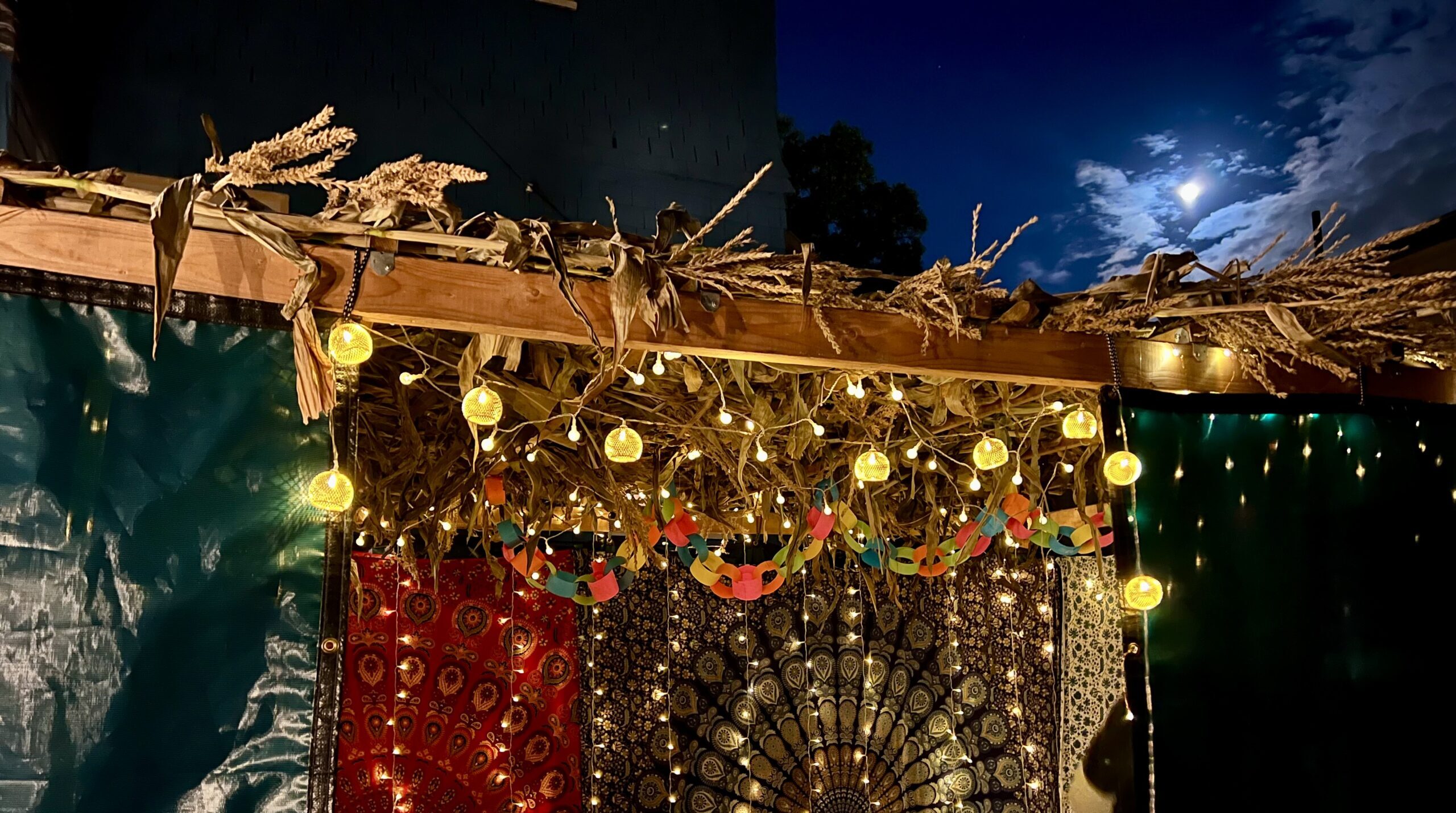Miller Center Sukkot & the Challenge of Intra-Jewish Dialogue on Israel

“Spread over us your shelter (sukkah) of peace…”
-Jewish Evening (Ma’ariv) Service
Step inside any sukkah (harvest booth) during the fall Jewish festival of Sukkot—“The Season of Our Joy”—and you immediately sense the paradox: flimsy walls, a roof of branches, a vulnerable structure open to rain and wind. Yet, for a full week the sukkah becomes a place for meals, conversation, and connection. We are called not only to build sukkot, but to welcome guests (heavenly and human) to sit inside them; to make room for others and treat them with dignity and care.
What does this have to do with talking about Israel? Everything.
Two years since the atrocities of October 7th, and with the brutal war in Gaza still raging, conversations within the Jewish community (not to mention interreligious and cross-cultural settings) have become increasingly tense and often unmanageable. On college campuses, in synagogues, and around family tables, sharp rifts cut across generations and ideologies. Many people retreat into silence or ideological echo chambers when grappling with Israel, Palestine, Zionism, anti-Zionism, and other fraught terms entangled in a mess that feels too hard to navigate.
But as we know from history and our present moment, silence and separation do not serve us. If there was ever a time to construct sukkah-like spaces where Jewish interlocutors can be honest and curious, listening for what the spiritual polymath Howard Thurman called “the sound of the genuine,” that time is now.
Earlier this fall, we launched Panim el Panim (Face to Face): Engaging Israel Across Difference, housed at Hebrew College’s Miller Center for Interreligious Learning and Leadership and funded by the Henry Luce Foundation.
Unlike many initiatives that strive to “go big,” Panim el Panim is intentionally small: A cohort of 12 senior Jewish leaders in greater Boston—rabbis, educators, and nonprofit executives—who will gather throughout the year to share personal stories, learn from subject experts—including both Israelis and Palestinians—develop dialogical and facilitation skills, and engage in challenging conversations—away from the day-to-day pressures of the workplace.
Through Panim el Panim, we are seeking to co-create ‘sturdy-enough spaces’ where resilient listening is possible, and where the noise of accusation and denunciation can subside enough for the ‘sound of the genuine’ to be heard.
The need for this program is clear: Many Jewish leaders—including the most experienced—feel both exhausted and lonely in navigating the Israeli-Palestinian conflict and the “conflict about the conflict” in their organizations, communities, and beyond. They crave opportunities for substantive and confidential conversation with peers, which includes space for questioning and uncertainty. Such opportunities provide leaders with the strength (hizuk) to reengage their co-workers, board members, and donors in complicated, often trying, deliberations with greater confidence and creativity.
What we hear anecdotally was recently reflected in data from M², The Institute for Experiential Jewish Education’s poll of Jewish professionals: Less than a quarter of those surveyed reported feeling hopeful about the future. The most frequently cited reason for their lack of hope was “internal communal division,” which often results in a breakdown of productive discussion and debate (makhloket).
And yet, when leaders have opportunities to pause, and are equipped with knowledge, skills, and spaciousness to engage with one another across differences, something significant can happen. We’ve seen it firsthand.
 Following our first workshop, one participant shared: “I had a deeply personal conversation with a fellow Jewish educator that would not have been easy—or even possible—in most other settings. In my professional role, I am required to be ‘on’ all the time, which leaves little room for me to grow in my relationship with Israel. Being with reflective practitioners in such an intimate setting is exactly what I need.”
Following our first workshop, one participant shared: “I had a deeply personal conversation with a fellow Jewish educator that would not have been easy—or even possible—in most other settings. In my professional role, I am required to be ‘on’ all the time, which leaves little room for me to grow in my relationship with Israel. Being with reflective practitioners in such an intimate setting is exactly what I need.”
Panim el Panim is not about agreement, but about developing informed and empathic approaches to seeing, hearing, and understanding each other. Clarifying points of difference is one of our basic goals. These conversations can be very hard. But they can also be transformative—and Sukkot helps us understand why. The sukkah does not pretend to be a fortress. It is not designed to keep out wind, rain, or disagreement. Its strength is in its openness. When we invite others in, we affirm that our collective safety ultimately lies not in walls that exclude, but in relationships that endure.
If Jewish leaders are to guide their communities through this turbulent time, we need to practice speaking thoughtfully with each other, voicing dissent, and experiencing genuine curiosity as an antidote to dread and defensiveness. As the philosopher Martin Buber taught, “When we encounter another individual truly as a person, not as an object for use, we become fully human.”
The challenge, of course, is to do so with those with whom we disagree—both in intra-Jewish settings and beyond.
Sukkot reminds us that even in a world of storms, we can choose to co-create ‘sturdy-enough’ spaces for welcome. We can choose to step inside, invite others to speak their truths respectfully and challenge ourselves to listen intently. In doing so, perhaps we can even experience a measure of joy in this deeply painful season of our lives.
Jordan Namerow co-directs Panim el Panim with Rabbi Or Rose. A writer and communications professional, she serves as a program consultant and grant writer for Hebrew College.
Rabbi Or Rose is the Founding Director of The Miller Center for Interreligious Learning and Leadership of Hebrew College and Senior Consultant to Interfaith America.

